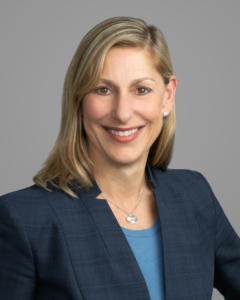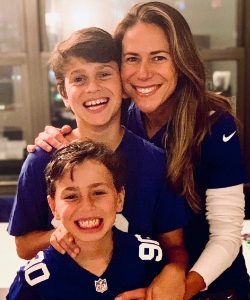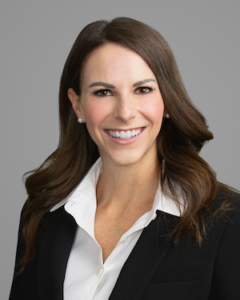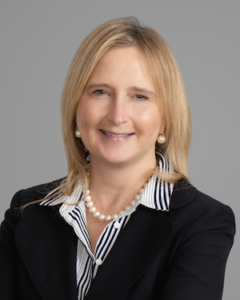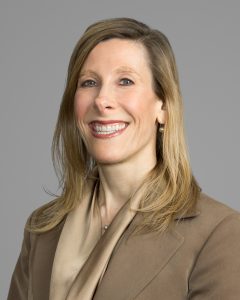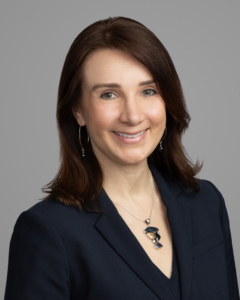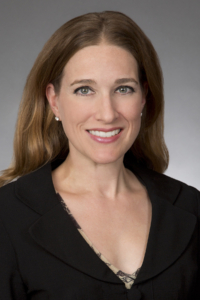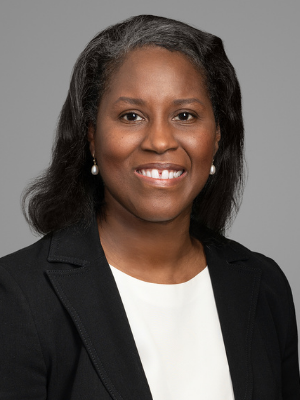 “People need to feel you’re hearing them and you’re answering truthfully on what you can deliver,” says Louise Carroll, who recently joined Katten as a partner in the Real Estate practice. “That skillset has served me in every situation — whether negotiating a deal, talking to politicians at the federal, state, and city level or calming passionate constituents.”
“People need to feel you’re hearing them and you’re answering truthfully on what you can deliver,” says Louise Carroll, who recently joined Katten as a partner in the Real Estate practice. “That skillset has served me in every situation — whether negotiating a deal, talking to politicians at the federal, state, and city level or calming passionate constituents.”
Carroll talks about her experience as former New York City Housing Preservation and Development (HPD) Commissioner, leveraging her differences, using her voice, and navigating the complexities of the law to find innovative win-win solutions that have helped deliver nearly a quarter-million affordable housing units in the city’s 59 community districts — one of the most expansive affordable housing plans in U.S. history.
Hands-On Career in Creating Affordable Housing
Born in the U.S. Virgin Islands and raised in Saint Lucia, Carroll attained her undergraduate degree in Wales, acquired her MBA in England and worked as a senior executive for a German ship-owning and brokerage company in Cyprus before entering Tulane University Law School. She began her legal career serving as a transactions attorney for the business law division of the New York City Administration for Children’s Services, followed by prosecuting public officials who violated New York City ethics laws, and advising on real estate projects and housing programs and policies, as well as drafting zoning and tax statutes. Over a 20-year public service career, she worked her way up to the General Counsel role and then became Commissioner of the largest municipal housing agency in the country.
At the time, Carroll had no idea how gratifying working with the affordable housing industry would be. She recalled the first time she went to speak to tenants in a supported housing residence in Times Square, in which HPD was a government partner on the building renovation. She saw how much the project affected and changed how the tenants felt more positively about their current life situation, and gave them not only a safe and affordable place to live, but also inspiration and hope at the potential of what might lie ahead in their lives.
“When I look at all those massive buildings on Riverside Drive, or Hudson Yards, all along the Greenpoint waterfront, I can say, ‘This is my building, this is my building, this is my building,’” says Carroll. “I have managed to put low-income tenants and families in some amazing buildings throughout the city, next to good schools and great access to transit. It took a great deal of work —drafting and revising legislation — to make these projects happen. This industry can be so complex, because there are so many different players and different laws, that just finding a way to do it over and over was both amazing and fun.”
Navigating Complex Win-Win Solutions
Carroll prides herself on her ability to listen to many sides, navigate diverse interests and find the best compromise or solution. “In good negotiating, you have to understand the viewpoint of the person across from you — what it is they’re trying to achieve. You have to listen and have empathy, and make sure people understand the parameters of where you can and can’t meet them and why,” she says.
Carroll met Katten partners Ken Lore and Martin Siroka when they were working together on many mixed-income housing developments. “I knew they were clever lawyers who were able to problem solve on really difficult issues, so I’ve respected them greatly over the years,” says Carroll, who herself joined Katten in March.
As Commissioner of the NYC HPD department, Carroll worked directly with Katten on real estate deals that had a combination of low-income housing tax credits, tax-exempt bonds, and other innovative financing structures, each with complex requirements and regulations. “What I loved was that every time I did a deal with Katten, we improved the status quo by making new changes that accommodated the private lenders in a better way. There are often cookie cutter deals in city government, but that was not the work we were doing together,” she says. “Instead, we tackled the intricacies of laws to figure out how to make them work best for every stakeholder involved in the project. Finding solutions to those incredibly complex problems was personally gratifying and provided housing to so many communities.”
When her public service career was winding down, she considered whether to work for a not-for-profit organization or take a post at a law school, but realized she wanted to continue working on impactful deals. “Some people could do the HPD commissioner role as a figurehead job, but that’s not how I did it. I read every piece of legislation. I was there for every policy draft and every brainstorm. I formed the working groups,” Carroll says. “I knew that finding a job that could compare was not going to be easy, but this role with Katten offered me the opportunity to work on affordable housing projects in the way that I love, and to contribute to the firm’s widely renowned practice.”
At Katten, Carroll’s practice focuses on affordable housing and community development, mixed-income housing, public finance and government relations. She is highly regarded at the firm for her experience and capabilities to guide clients through the financial and legal complexities of housing projects.
Leveraging Her Difference
“I went to an all-girls Catholic school, where the nuns told us we were as good as anybody. That’s, in part, why I’ve always spoken up,” says Carroll. “I understand the stereotypes or expectations when a woman is in the room — how we’re expected to speak, defend our work, or refrain from speaking in an authoritative way — and I’ve told myself, ‘None of that applies to you, because you weren’t born and raised in this culture, so you’re going to embrace the otherness.’ So, I speak up, respectfully and never rude, but I have to speak.”
Carroll leverages her experience and seniority to advocate for others. “When I see people not speaking up or being silenced or pushed out, I step into that space and say, no, I would like to hear what this person has to say,” she notes.
While Carroll was warned the commissioner position would be an outward-facing job, she couldn’t have prepared for just how much moment-to-moment adrenaline would be involved and how she would need to transition from a naturally shy person to an extrovert.
“As Commissioner, I was constantly on the move, interacting with many different people in sometimes challenging circumstances throughout the day. I might start the morning with a press conference, go to a 50-person meeting to solve problems around affordable housing, switch to working with my policy team on rewriting legislation, and then shift to being present for heated phone calls with city council members,” recalls Carroll. “I learned to put my game face on and step into the moment, whatever it was. Sometimes that meant winging an impromptu speech.”
No Task is Insignificant
Carroll credits her grandmother for inspiring her lawyer deal-making mentality of getting things done. Her grandmother instilled in her at a young age that no matter how big or small a task, you do it well.
“Everything you touch, you have to do the best you can — even when you’re not leading the team, and are just a part of the team,” says Carroll. “Before I became commissioner, I was the attorney that people could call at 11 p.m. and who would send the agreements back at 3 a.m. People started to talk about my work and every time I got a new challenge, even when they were difficult challenges, I would aim to make things better — and that kept me moving forward.”
A decade ago as a new mom with a rising legal career, she made it home from work for bedtime, and then started working again — knowing it was important to her advancement. “We all have adversity in some way,” says Carroll. “There are real issues, such as childcare. There are also times and places to address it, and how we handle our adversity is as important as the adversity we face.”
Married for nearly twenty years, Carroll has one 10-year-old son and enjoys watching him play travel ice hockey, a sport off her radar growing up as a Caribbean woman. Her sport of choice: tennis. She completes twice a week against tennis pros — and, sometimes, she wins.
By Aimee Hansen

